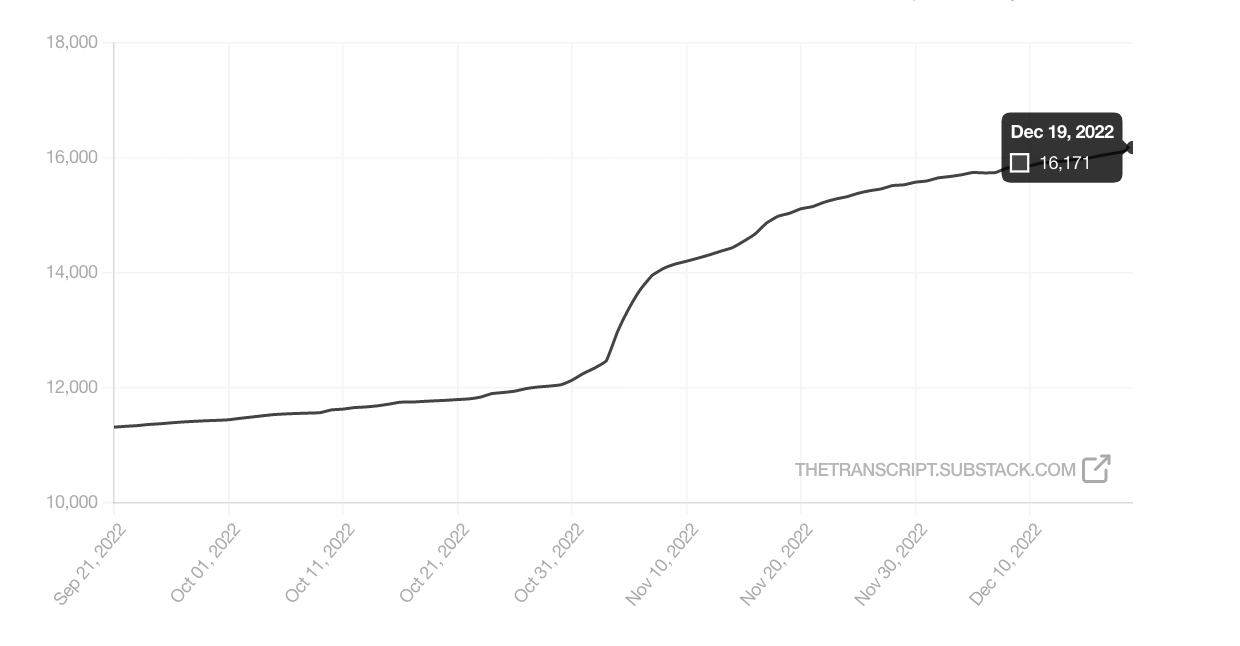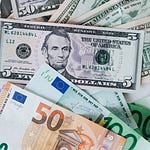In this episode, we review the year 2022 through quotes from earnings calls and also track the incredible growth we have had at The Transcript.
The episode is based on yesterday's newsletter which is available on Substack.
A transcript of this podcast, with relevant images and quotes, is available for all subscribers only after the show notes below. Our podcast is available on Apple Podcasts, Spotify, Google Podcasts, YouTube, and Amazon Music.
Show Notes
00:00:00 Introduction
00:00:07 A Year of Worries
00:01:51 The Fed Behind the Curve
00:04:51 Inflation Peaked
00:06:41 The End of an Era
00:08:22 Looking into 2023
00:10:04 Incredible Growth at The Transcript
[00:00:00] Scott: Welcome everyone to The Transcript podcast. This is a special episode of the podcast because this will be our last one of 2022.
A Year of Worries
We sent out a newsletter yesterday, and this was a newsletter like the other ones that we've sent out as our last post of the year, which is a review of the full year. And we try to take a quote from each newsletter that we sent during the year and just put them together in a narrative of the way that the year unfolded. So if you just read through this you'll be able to see where we started and where we ended 2022, and it's always interesting to me when I sit down to do this, how much changes in a year and the things that you forget that happened at the beginning of the year. And the first newsletter that I pulled up, the world was dealing with omicron, still, it was surging. And there were so many infections in the US it felt like everybody was getting it. And the thing that was crazy that I picked up is, I think we were all scared of Covid still a little bit at the end of last year. And then I think Omicron, at least in the US made us not that scared of Covid and just made it that we were gonna live our lives with Omicron. And so you could see that in the economic analysis in the commentary from CEOs, I think at the beginning of January, people were wondering, is this going to tank the economy? And then by our second newsletter of the year on January 24th, it was clear that we were all just learning to live with Covid that was endemic, and we were going to all deal with it. So Erick, any thoughts on where we started the year, this year 2022?
[00:01:27] Mokaya: Yeah, I totally agree with you. It shows you a bit of the cycles of worries that people go through throughout this year. So like you started with Omicron. And then January, February could sense that inflation was starting to feel like a big issue that is going to be this year. And then suddenly the situation in Ukraine happened and then inflation spiked to the top of issues in terms of worry. And then now for the rest of the year, it's been just a mix of the war in Ukraine.
The Fed Behind the Curve
A bit about the Fed being behind the curve. In fact, for me, if I had to title this newsletter, I would say the Fed being behind the curve. And you could sense that from the very beginning of the year, they didn't raise rates in January. And for the rest of the year, they've been chasing inflation, which has been spiking, especially exacerbated by the situation in Ukraine. So I think that's a key takeaway. I think the Fed has been incredibly behind the curve. But they've tightened much faster than the last few periods trying to catch up with containing inflation. Do you feel the same also?
[00:02:23] Scott: Yeah, absolutely. I think it was, again, you forget the way that things happened over the course of the year. Right now we're so focused on, the Fed was raising by 75 basis points and they slowed down to 50 basis points. But you really forget that at the beginning of the year, they actually didn't even raise rates in their January meeting because they were so concerned about spooking markets. And then their first rate raise in March was just a 25 basis point increase and they didn't really start raising by 75 basis points until the fall. It was the aggressiveness, with which the Fed has been moving recently is really a recent occurrence. I think they started to get some hawkish rhetoric around March. But they really didn't, they were not tightening that aggressively for much of the year. And I think the other part of it is that their own forecasts of how much they would need to tighten increase throughout the year, because to your point, they were behind the curve, or at least they felt like they were behind the curve. And I was looking in at some point during the year it was in April, even April 20, Raphael Bostic and Mary Daly were both talking about needing to be at between 1.75% and 2.5% short-term rates by the end of the year. And they were talking about getting to a neutral stance. So remember for much of the year, we entered the year within a very accommodative stance, and then the Fed realized, oh, we'll have to bring this to neutral at least. And now they're talking about restrictive. It was really Jackson Hole was a big turning point for the year where they went to a restrictive stance or they talked about restrictive stances but any thoughts?
[00:03:58] Mokaya: Yeah. Actually one of the quotes that stuck out for me was the one from the Bank of Philadelphia, I think around April 4th. I think what finally helped them notice that there was actually a price increase in the economy was golf dues rising at local country clubs. That tells me a lot about how a bit away from reality the Fed has been for a long time because at the time they caught up with, hey, inflation's actually catching up, it was pretty late to start raising rates. So I think and now they've raised it so fast and now everybody's a bit worried, I think going into 2022. Have they raised so fast that they're going to cause a recession next year? And I think that's the worry currently as we go into the new year I would say also. Any other things that you may have picked up other than the Fed being a bit too fast in raising rates or a bit too slow in raising rates at first and then going faster than normal later in the year?
Inflation Peaked
[00:04:51] Scott: Yeah. I think, again, one of the fun things about this exercise is when you look back over the whole year, you see some of the underlying trends happening in a different way than what you're looking at when you're just in the day-to-day. And I think one of the things I really noticed, which I'll carry into 2023 as well for myself, is that the inflationary peak started to begin to inflect and subside in like the May or April timeframe like we have a May 2nd issue in which we titled ‘Inflation Peaking?’. And when I looked at it, when I first put it down for this exercise, I looked at that and I thought, oh, was that a mistake by us that we were looking at inflation peaking too early? And in some ways, it was because the CPI numbers still stayed really high, but they've started to come down. The CPI, that was near peak, if not the peak of CPI, year-over-year inflation. And I think throughout the year, even post-May, the inflationary headwinds have continued to abate, but I think, again, this was the thing that I picked up in looking at the whole year, was that even though inflation was starting to abate, the Fed was actually getting more aggressive in the way that it was combating inflation starting in August. In August, Powell came to Jackson Hole and said, we're not done yet, we're gonna keep raising rates and we have to have a restrictive policy and inflation is getting out of control. And that has been really the change that has created this second wave, the second leg of softness in equity markets in the second half of the year.
Source: Reuters
[00:06:24] Mokaya: Yeah, I think we picked on pretty early that inflation was peaking by guess if you get quotes from CEOs and all, there's a bit of a lag in which it comes. So our quotes tend to be a bit forward-looking in the sense of like the CEOs are seeing the data and finally when it comes to the actual data that maybe the CPI, takes a bit of time for that.
The End of an Era
"An entire generation of entrepreneurs & tech investors built their entire perspectives on valuation during the second half of a 13-year amazing bull market run. The "unlearning" process could be painful, surprising, & unsettling to many. I anticipate denial." - Benchmark Capital General Partner Bill Gurley
So I think one of the other things I noticed this year is also, it became a bit of the end of an era. And I think that's what we titled our May 9th issue. Benchmark Capital partner, Bill Gurley talked about there having been a 13-year amazing run and now suddenly people like me who have never experienced a rate hike started to experience it in a very aggressive way. That's one of the things I also noticed. And the second thing of course about Jamie Dimon talking about the financial hurricane. He's been on that thing of a hurricane throughout the whole year. And I feel like at some point he may be the boy who cried wolf and everybody didn't listen to them. But I think we haven't seen a hurricane so far. So those are two things that would also stand out for me in terms of the impact of the rising interest rates on financial markets and the hurricane, which may or may not come at this point in time. Any thoughts?
[00:07:32] Scott: Yeah. Yeah. I like how you're framing the end of an era and hurricane. These are two core, iconic quotes from the year 2022. Another piece of language that really sticks out to me that we wrote over and over again this year was resilient. How resilient the consumer was and how resilient consumer spending was. And there was for a long time this year this tension between the shift from good spending during Covid back to services spending. And you would see goods-focused companies starting to see a pullback in the consumer and they were talking about economic weakness. But then the services-based companies were not seeing that weakness. And really I think our guiding north star, so to speak, on what was going on with the consumer ended up being in the credit card companies throughout the year and what they were seeing in the high-level data.
Looking into 2023
There have been some real signs that the consumer is starting to slow as we look into 2023, I think the quote from Wells Fargo CEO last week that we put in said there's a slowdown happening, there's no question about it. I think that is one quote that really sticks with me going into 2023 as well as the Fed press conference last week of Jerome Powell again saying, we'll stay the course until the job is done. Despite what you and I have picked up for the last few weeks about some real slowing and cooling trends in the economy. And so I think looking into 2023, I think the big question is exactly what the Fed wants us to be focused on. How high and how long? How high are they gonna raise rates and for how long are they going to hold them there? Do you have any forecasts or opinions on how high and how long?
[00:09:09] Mokaya: I actually don't. But what I feel, I think to double click on the issue of the consumer, the last few weeks, for most of the year, you said the consumer has been resilient, but there's a weakness happening and you find that even the high-end consumers are now coming back down to shop at Walmart and all. I think we are ending the year with a consumer who's actually going to be super strained going into the first half or second half of next year. Excess savings are starting to dwindle. They're starting to feel pressure in terms of maybe maxing out their credit cards. So I think looking into next year, we'll be paying a lot of attention to how consumers are doing, especially after the holiday season and after the holiday spending, how did they spend? So I think those are some of the things that we'll be tracking going into next year. So I think looking into next year, a lot of things to track and of course at The Transcript will be keeping track of a lot of these things. So this is a really good wrapper for the year just to have a look at how we've done so far this year.
Incredible Growth at The Transcript
So I wanted maybe as we end, I wanted to maybe discuss how our progress has been at The Transcript. It's been an incredible run for us. Actually, this is our almost 80-something, I think 86 or the 87th episode of the year. So I think we've grown a lot. Any reflections on The Transcript itself, and maybe as the founder of The Transcript in terms of how have you seen us grow throughout this year? This is our 87th episode so to speak on The Transcript podcast and it's been an incredible year. So how would you reflect on that?
[00:10:33] Scott: Yeah. I think we've just had, to your point, really incredible growth this year. I think it's passed both your and my expectations of the amount of growth. We've more than doubled our total readership. We've almost tripled the number of premium subscribers that we have who are reading The Transcript now and directly supporting the work. And this is something that you and I have been working on for I think like 10 years now. And we've just been doing it labor of love. And if you look at the true growth path of this it's just been slow and steady. But this year, for whatever reason, we're starting to get momentum
and we're both really grateful to speak for myself at least, I’m really grateful to have all of the new readers and subscribers coming in and watching our work. I think one of the nice things about doing this year in review as well is to see how well we've tracked the economy throughout the year. And again, hopefully, one of the reasons that we do this, whether people are watching it or not, is this is a primary way that I manage my own money. And I have found over the years that anytime I stray too much from what The Transcript is picking up, it's usually a bad choice.
So just to manage the portfolio consistent with the headlines that we're seeing that we're writing has always been the best process for me. And I think it's worth noting as well, one of the big inflection points this year was you being able to come on full-time, Erick, and really push the amount of content that we're generating. And I think to our readers, our listeners as well that speaks to, when you join The Transcript as a premium subscriber, it gives us more resources to be able to do more things, produce more content, generate more investment ideas for our readers and listeners. So it is really important to have the support as well because it allows us to be able to put more work and more energy into this project. So any additional thoughts?
[00:12:20] Mokaya: You've put it pretty well, I think. I mean you could see a serious inflection point from May when I started off full-time. You can see an inflection point in terms of paid subscribers, in terms of our total subscribers and even on Twitter. So I think we are able to generate a lot more content now and to be a lot more active and to read a lot more transcripts now that I'm full-time. If you switch to the premium side you are able to help us to access better resources to access as many transcripts as possible to also generate as much content as we can so that we are able to keep you informed and engaged and at the same time to be able to manage your own portfolio. So our rallying call is welcome on board. Help us grow and help us build a place where you'll have the best quotes from earnings calls as much as possible, and then we're able to keep you informed and to keep you growing as a reader and also for us to also keep growing at the same time. So grow with us. I think that's a key call as we finish the year. So happy holidays and see you again in the next year as we keep building on The Transcript, but our Twitter handle is never silent, so we'll keep posting there as much as we can. So see you in the new year. I think that's my ending rallying call. Anything to add or should we end there?
[00:13:30] Scott: I don't think so. Happy holidays, everyone. Happy happy New Year. We'll see you in 2023. Ready to go.
[00:13:37] Mokaya: Ciao.













